
Habbo is an online community and virtual world aimed at teens and young adults. It is owned and operated by Sulake, a Finnish company. Founded in 2000, Habbo has expanded to nine online communities, with users from more than 150 countries. Since August 2012, more than 273 million avatars have been registered with an average of 500,000 visitors per month.

A virtual world is a computer-simulated environment which may be populated by many users who can create a personal avatar, and simultaneously and independently explore the virtual world, participate in its activities and communicate with others. These avatars can be textual, graphical representations, or live video avatars with auditory and touch sensations. Virtual worlds are closely related to mirror worlds.
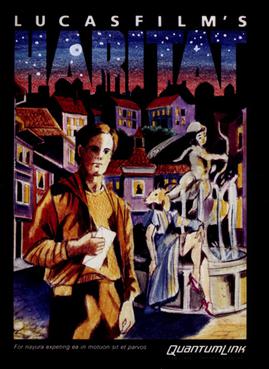
Habitat is a massively multiplayer online role-playing game (MMORPG) developed by LucasArts. It is the first attempt at a large-scale commercial virtual community that was graphic based. Initially created in 1985 by Randy Farmer, Chip Morningstar, Aric Wilmunder and Janet Hunter the game was made available as a beta test in 1986 by Quantum Link, an online service for the Commodore 64 computer and the corporate progenitor to AOL. Both Farmer and Morningstar were given a First Penguin Award at the 2001 Game Developers Choice Awards for their innovative work on Habitat. As a graphical MUD it is considered a forerunner of modern MMORPGs unlike other online communities of the time. Habitat had a GUI and large user base of consumer-oriented users, and those elements in particular have made Habitat a much-cited project and acknowledged benchmark for the design of today's online communities that incorporate accelerated 3D computer graphics and immersive elements into their environments.
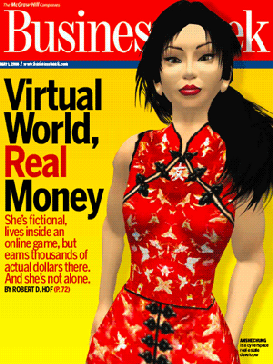
Anshe Chung is an avatar of Ailin Graef in the online world Second Life. Referred to as the "Rockefeller of Second Life" by CNN, Graef has built an online business that engages in development, brokerage, and arbitrage of virtual land, items, and currencies. Her work has been discussed in Business Week, Fortune and Red Herring.
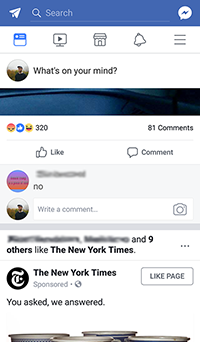
Mobile social networking is social networking where individuals with similar interests converse and connect with one another through their mobile phone and/or tablet. Much like web-based social networking, mobile social networking occurs in virtual communities.
WeeWorld was an online game and messaging website, originally created in 2002 with a company that was based in Glasgow, Scotland, with a few offices in London and Boston, as well as other cities in the USA. The company created WeeWorld.com, a social networking site, to which was mostly geared towards teens and tweens. The website was also known for its brand of instant messaging and chat-based avatars, known as “WeeMees”, which were also released on a variety of digital platforms and services. There were approximately 180 million WeeMees created worldwide.

Tagged is a social discovery website based in San Francisco, California, founded in 2004. It allows members to browse the profiles of any other members, and share tags and virtual gifts. Tagged claims it has 300 million members as of 2014. As of September 2011, Quantcast estimates Tagged monthly unique users at 5.9 million in the United States, and 18.6 million globally. Michael Arrington wrote in April 2011 that Tagged is most notable for the ability to grow profitably during the era of Facebook.
Playphone is a mobile gaming platform founded in 2003 headquartered in San Jose, California that provides direct-to-consumer mobile content distribution. It is funded by Menlo Ventures, Cardinal Venture Capital, and Coral Capital Management, and is a subsidiary of GungHo Online Entertainment.
Roblox is an online game platform and game creation system developed by Roblox Corporation that allows users to program games and play games created by other users. Created by David Baszucki and Erik Cassel in 2004 and released in 2006, the platform hosts user-created games of multiple genres coded in the programming language Lua. For most of Roblox's history, it was relatively small, both as a platform and as a company. Roblox began to grow rapidly in the second half of the 2010s, and this growth has been accelerated by the COVID-19 pandemic.
Virtual goods are non-physical objects and money purchased for use in online communities or online games. Digital goods, on the other hand, may be a broader category including digital books, music, and movies. Virtual goods are intangible by definition.

King.com Limited, trading as King and also known as King Digital Entertainment, is a Maltese video game developer and publisher based in St. Julian's, Malta that specialises in social games. King gained prominence after releasing the cross-platform title Candy Crush Saga in 2012, considered one of the most financially successful games utilising the freemium model. King was acquired by Activision Blizzard in February 2016 for US$5.9 billion, and operates as its own entity within that company. King is led by Riccardo Zacconi, who has served in the role of chief executive officer since co-founding the company in 2003. Gerhard Florin took over Melvyn Morris's role as chairman in November 2014. As of 2017, King employs 2,000 people.

Zynga Inc. is an American developer running social video game services. It was founded in April 2007, with headquarters in San Mateo, California. The company primarily focuses on mobile and social networking platforms. Zynga states its mission as "connecting the world through games".

Facebook Credits was a virtual currency that enabled people to purchase items in games and non-gaming applications on the Facebook Platform. One U.S. dollar was the equivalent of 10 Facebook Credits. Facebook Credits were available in 15 currencies including U.S. dollars, pound sterling, euros, and Danish kroner. Facebook was hoping eventually to expand Credits into a micropayment system open to any Facebook application, whether a game or a media company application. Facebook deprecated Credits in favour of users' local currencies.

Fantage was a MMORPG involving a virtual world containing a range of online games and activities, developed by Fantage Inc. The game featured a customizable cartoon avatar, called a "Fantagian", that users can customize with items ranging from hair to clothing and accessories. Fantage was released to the general public on March 17, 2008, and had since expanded into a large online community— the game had over 16 million registered users by January 2012 and over 30 million by December 2014.

Woozworld is a virtual gaming community and social network service founded in 2009 and headquartered in Montreal, Quebec. Woozworld allows users to connect with each other through customizable profiles and interactive activities.
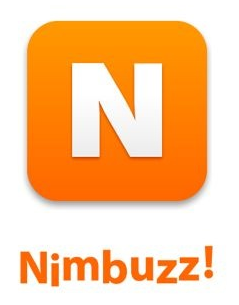
Nimbuzz is a proprietary cross-platform instant messaging and social media and mobile payment developed by Kuraakani Online Private Limited, with the origins of its technology dating back to the early 2000s. As of March 2013, Nimbuzz had 150 million users in 200 countries. By April 2014, Nimbuzz was growing by more than 210,000 new registrations per day. In October 2014, now with over 200 million users, New Call acquired 70% of Nimbuzz, valuing the app at $250 million. Under CEO Sujit Acharya's leadership, Nimbuzz suite of applications enables users to enjoy end-to-end encrypted free calls, instant messaging, games, file sharing,social networking, mobile payments & movies on their mobile device. Nimbuzz has more than 3 million lines of code. Initially, Nimbuzz offered discounted calling rates to most countries in the world. The platform processed more than a billion call minutes and in excess of 100 billion messages a month.
The World's Online Festival (WOLF) is a messaging and gaming platform with apps for iOS and Android. Users can create groups where they can send text, image, and short audio messages. Groups feature a Stage which provides five live microphone slots for users to chat. The app features a store where users can purchase in-app credits that can be used to buy additional features, utility chatbots and games, and to send in-app gifts to other users. Users have a reputation level that increases from actions such as playing chat games or purchasing credits.
Kakao is a South Korean internet company that was established in 2010. It formed as a result of a merger between Daum Communications and the original Kakao Inc. In 2014, the company was renamed Daum Kakao. In 2015 it was rebranded once more, reverting simply to Kakao.
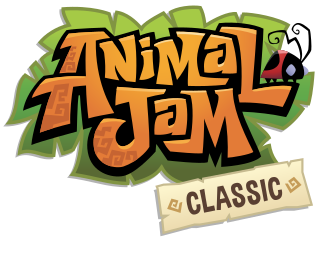
Animal Jam Classic, formerly known as Animal Jam, is a massively multiplayer online game that is developed by WildWorks and recommended for kids up to the age of 12. It was launched in 2010, in collaboration with the National Geographic Society. As of late 2020, there were 3.3 million monthly active users and a lifetime total of 130 million registered players in 200 countries across both Animal Jam Classic and Animal Jam.

Nintendo, a Japanese home and handheld video game console manufacturer and game developer, has traditionally focused on games that utilize unique elements of its consoles. However, the growth of the mobile gaming market in the early 2010s led to several successive fiscal quarters where they were running at a loss. Nintendo, led by president Satoru Iwata at the time, developed a strategy for entering into the mobile games market with development partner DeNA, as a means of introducing their franchise properties to mobile players with a goal of bringing them to buy Nintendo's consoles later. Since 2015, Nintendo has internally developed a number of mobile games, while also publishing games with other developers, including games outside of the initial DeNA partnership. Several of them have been entered the top-downloaded games list on the iOS App Store and Google Play stores, earning over US$100 million in revenue in total.















